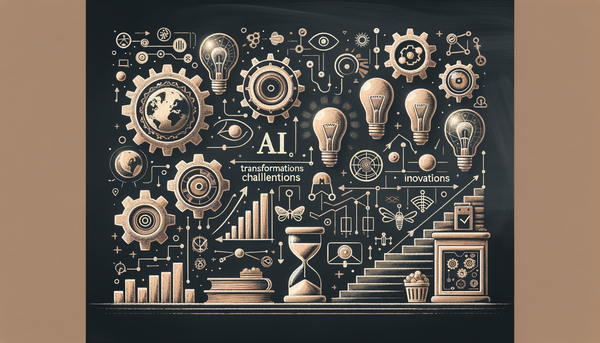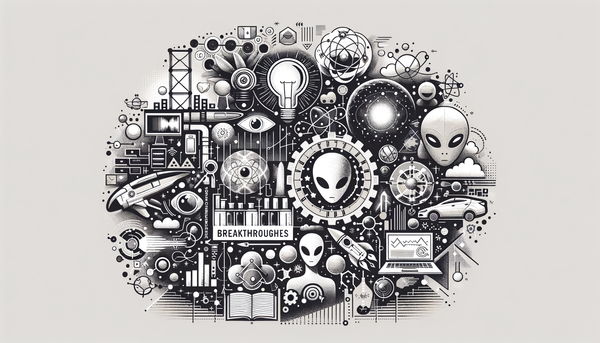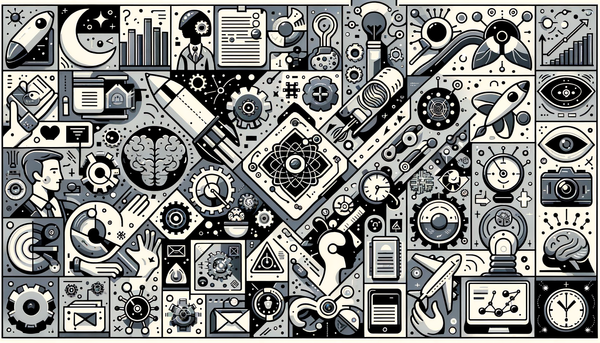Generative AI in Banking: Transforming Operations and Customer Interactions
In this article, we explore the rapidly shifting landscape of artificial intelligence, delving into how international regulatory efforts are clashing with national priorities, the transformative applications of generative AI in banking, and emerging concerns about cognitive reliance on technology. By examining global events like the U.S. and Britain opting out of the OECD Principles on AI, analyzing dynamic use cases in financial services, and considering warnings from recent Microsoft studies on human critical thinking, we aim to paint a comprehensive picture of both the promises and pitfalls that AI presents in today’s world.
International Regulatory Dilemmas: Innovation Versus Oversight
The global community has long been eager to harness the transformative potential of artificial intelligence while ensuring its responsible deployment. Recently, over 40 nations in Paris signed the “OECD Principles on Artificial Intelligence” to facilitate ethical guidelines, accountability, and the minimization of adverse outcomes. However, dissenting voices from the United States and Britain have underscored a significant debate – whether stringent, overarching international accords could inadvertently stifle innovation and compromise national security.
It is essential to understand that the OECD accord aims to hold AI developers to a higher standard of responsibility. In theory, ensuring ethical development could prevent harm from unintended consequences, yet practical concerns remain about the potential constraints it might impose upon technical advancement. The US and Britain's reservations highlight a fear: that adhering to an international framework might lead to inflexibility and hinder the rapid progress that drives competitive advantage on a national level.
I’ve always found the tension between regulation and innovation reminiscent of historical debates in technology policy—think about early computer network developments where over-regulation was argued to slow down what would become the unstoppable Internet. The current discourse in the AI arena is no less contentious: should governments impose global constraints even if they might delay new breakthroughs? As
Andrew Ng once said, "Artificial intelligence is the new electricity." For electricity, rapid innovation was essential, and heavy-handed regulation too early on might have jeopardized its potential to transform entire economies.
Moreover, the broader geopolitical implications are profound. National governments are weighing collective benefits against the protection of proprietary technologies. Such decisions also come with hidden risks: failing to adhere to mutually agreed ethical standards might lead to divergent AI ecosystems, making international collaboration more difficult. In a world that is increasingly globalized, the question remains whether harmonizing legal and ethical AI standards is a necessary step toward a safer digital future or a bureaucratic hurdle to breakthrough innovation.
Generative AI in Banking: Changing the Game in Financial Services
Across various sectors, AI’s transformative impact is unmistakable. In the realm of banking, generative AI has begun to shine as a true game-changer. The technology leverages immense datasets and sophisticated algorithms to foster improved operational efficiency and elevate customer experiences. Financial institutions are rapidly adopting innovations ranging from real-time fraud detection to personalized wealth management strategies and intelligent customer support systems.
One prime example of generative AI in action is its role in fraud detection and prevention. Traditional methods often relied on static models and delayed detection, but generative algorithms are revolutionizing how banks monitor transactions. By analyzing vast amounts of data in real-time, these AI models identify patterns and flag anomalous activities almost instantaneously. This capability not only saves institutions significant financial resources but also protects customers against potentially devastating fraud incidents.
Another notable application is in the realm of personalized wealth management. With AI, banks can now tailor investment strategies to individual customers by considering their historical data, risk tolerance, and personal financial goals. Imagine having a personal financial advisor who understands your spending patterns, risk appetite, and future aspirations—a vision that is rapidly becoming reality thanks to generative AI technologies. This individually tailored approach leads to higher customer satisfaction, deeper trust, and ultimately, enhanced client retention.
Moreover, intelligent chatbots and virtual assistants are revolutionizing customer service in banking. These systems, empowered by advanced generative models, can handle a wide range of queries 24/7, providing instant responses and personalized interactions. This evolution is dramatically reducing the workload on human customer service teams and ensuring that customers receive reliable support at any hour.
For anyone curious about the broader implications and further innovations in this segment, I recommend checking out the recent AI.Biz article on generative AI in banking, which details how these technologies are transforming operations and customer interactions in the financial sector.
The potential applications of generative AI extend beyond internal bank operations; they are reshaping the financial advisory landscape. There is a growing interest in integrating AI with blockchains and other distributed ledger technologies to further enhance transaction security and transparency. The notion is that by combining these innovative digital tools, banks can create a more resilient financial ecosystem that is not only efficient but also considerably more trustworthy from a consumer’s perspective.
The Cognitive Consequence: Balancing AI Reliance with Human Critical Thinking
While the practical and economic benefits of AI are undeniable, it is imperative to be aware of some unanticipated human consequences when working closely with intelligent systems. A recent study by Microsoft has raised alarms, showing that workers who depend extensively on AI tools may inadvertently diminish their critical thinking skills. The research suggests that when professionals excessively rely on AI to make decisions or offer suggestions, parts of their cognitive processing might be underutilized “turning off” portions of the brain that are essential for analytical thought.
This phenomenon is both fascinating and worrisome. On one hand, AI systems can rapidly process and analyze complex datasets, guiding users toward informed decisions. On the other, there is a risk that this convenience might lead to cognitive complacency—a state where human expertise and creativity take a back seat. For instance, while an AI-generated recommendation might provide a quick answer, it might bypass the critical, nuanced, and context-driven deliberation that a human mind can deliver.
Reflecting on this, I am reminded of a favorite insight:
"The real existential challenge is to live up to your fullest potential, along with living up to your intense sense of responsibility and to be honest to yourself about what you want." – Fei-Fei Li
This encapsulates the delicate balance between leveraging technology and nurturing our intrinsic abilities. Organizations need to cultivate an environment where AI supports human ingenuity rather than replacing it.
The modern workplace is caught in a paradox. While AI dramatically augments productivity, its overuse can lead to a dependency that might blunt our cognitive sharpness over time. This largely goes unnoticed in sectors where automation is aggressively embraced, such as banking, where efficiency is king. However, the long-term ramifications are critical for innovation sectors where original thought is the key currency.
It is important to underscore that AI should serve as a tool—a powerful adjunct in the decision-making process. Training and development programs need to be designed in a manner that encourages employees to engage with, question, and refine the outputs generated by AI systems. For example, educational initiatives can combine technology with critical thinking exercises, ensuring that workers continue to develop analytical skills while still benefiting from AI-driven insights.
This topic isn’t just confined to academic circles. In practice, fostering a balance where AI is used as a complement to human creativity rather than a crutch will require a cultural and organizational shift. Companies might consider scheduling “tech-free” brainstorming sessions or incorporating regular critical review exercises where employees evaluate AI-provided data. Such approaches can preserve the cognitive rigor essential for innovation and maintain the critical thinking muscle in a society increasingly enamored by the allure of AI.
Bridging the Divide: Toward a Harmonized AI Future
The multifaceted advancements in artificial intelligence bring us to a crossroads: the necessity of global cooperation versus the drive for national-specific progress, the transformation of industries like banking juxtaposed with potential cognitive atrophy, and the ever-present tension between innovation and regulation. By considering these elements together, one can appreciate the intricate web of benefits and challenges emerging from AI’s rapid advancements.
Taking the banking sector as a microcosm, we see how AI is reengineering traditional operations. Financial institutions are implementing advanced algorithms to fight fraud, tailor financial products, and provide continuous customer support. However, as these adaptive systems become more deeply integrated into strategic operations, questions of oversight and ethical accountability become more pronounced. In a broader context, if nations do not agree on a common framework for AI ethics—as is now evident from the US and Britain's hesitance—it might lead to fragmented policies that could hamper cross-border technological cooperation.
These global disagreements compel us to rethink the role of international accords in regulating AI. Is it possible to craft policies that shield us from the misuses of technology and also leave enough room for experimental breakthroughs? A balanced approach may involve decentralized standards where local contexts inform national regulations while maintaining a commitment to some global ethical benchmarks. Such a multi-layered regulatory ecosystem would allow for safe innovation ecosystems without succumbing to overly restrictive measures.
This debate extends beyond policy realms. It brings us face-to-face with societal questions concerning technology, employment, and education. The discourse on AI reliance calls into question not just the role of machines in our societies, but the potential erosion of human intellect if we fail to nurture our essential critical faculties. The importance of continuous learning, self-reflection, and human insight cannot be overstated in an era when the digital and the analog coexist more closely than ever before.
In drawing parallels, think of the advent of the printing press in Renaissance Europe. While it democratized knowledge and fueled intellectual growth, scholars were also wary of the overreliance on readily available information. They understood that manuscript copying and in-depth study of classical texts were essential to truly grasp human thought and wisdom. The balance we face now is similar: while AI promises tremendous efficiency, we must be cautious not to let it undermine the very essence of critical thought that has driven human progress for centuries.
Learning from the Past and Looking to the Future
The narrative of artificial intelligence continues to unfold, interweaving threads of regulatory foresight, technological innovation, and human cognitive development. Lessons from our recent experiences—be it the tug-of-war between international regulatory frameworks or the practical applications of AI in banking—serve as a guidepost for future endeavors. Over time, the conversation about AI is likely to pivot from merely celebrating innovation to addressing the deeper societal impacts it engenders.
At its core, AI is both a mirror and a driver of societal values. It magnifies our ambitions to create a more efficient and connected world, but it also reflects the intrinsic need for thoughtful regulation and human introspection. As practitioners, policymakers, and everyday users, we must acknowledge that while technology can magnify our capabilities, it can equally mask the skills essential for creative and analytical problem solving.
There is an old adage that holds particularly true in this context: "People fear what they don't understand." This observation, famously echoed by Detective Del Spooner in the film I, Robot, reminds us that a degree of skepticism towards new technologies is both natural and necessary. It provides the impetus to ask critical questions: What is the impact of these systems on our daily lives? How can we integrate ethical practices into increasingly autonomous decision-making processes? The answers may not be immediately clear, but these questions pave the way for a more balanced and informed approach to AI.
In considering these themes, it becomes evident that the future of AI lies in collaboration—between governments, industries, and the broader community. Harmonizing varied interests is undoubtedly challenging but achievable through transparent dialogue, continuous research, and a shared commitment to preserving both innovation and human ingenuity.
Ultimately, our journey alongside AI is reminiscent of the broader human quest for progress. As we harness the power of algorithms and data, we must also cultivate virtues like curiosity, resilience, and analytical rigor. Only then can we ensure that technology remains a tool that augments our capacities rather than diminishes them.
Future Directions: Opportunities, Challenges, and Ethical Considerations
Looking ahead, there are myriad opportunities as well as significant challenges on the horizon. The debate around AI regulation is far from settled. While the United States and Britain may have chosen a different path from many other countries in endorsing the OECD Principles, what this divergence means in the long run remains to be seen. It might create a fertile ground for innovation in one region while setting the stage for stricter control in others.
Emerging technologies continue to push the envelope across sectors. In banking, as generative AI applications become more pervasive, institutions must remain vigilant against novel threats and ethical dilemmas. Fraudsters are likely to evolve their tactics in response to enhanced AI defenses, and the financial sector will have to continuously adapt to maintain the delicate balance between reaping the benefits of technology and protecting customer interests.
At the same time, the cautionary insights from the Microsoft study serve as a wake-up call for organizations everywhere. The findings underscore the need for a dual approach: fostering an environment where technology supports human accomplishment while simultaneously investing in training programs that reinforce critical thinking and independent problem-solving skills. Such a holistic strategy is essential, not only to prevent intellectual stagnation but also to drive innovation in an era where AI is rapidly evolving.
To build a resilient future, businesses must develop policies that encourage a symbiotic relationship between artificial intelligence and human intellect. For instance, policies that mandate periodic human review of AI-generated decisions or collaborative platforms that integrate human judgment can bridge the cognitive gap. Additionally, academic research should continue to explore how AI impacts cognitive functions over time, further guiding best practices in workplace integration.
The collaboration between industry leaders, researchers, and policy makers will be pivotal in shaping an AI landscape that nourishes creativity rather than curtails it. Enhanced dialogue on ethical AI practices, supported by case studies and pilot programs, can offer concrete insights into how best to navigate these challenges.
As we consider these future directions, it’s clear that the evolution of AI is not merely a matter of technological advancement; it’s also a fundamental shift in how we think, work, and live. Balancing regulatory frameworks with the spirit of enterprise and safeguarding human cognition are imperatives that will help ensure technology remains our ally.
Further Readings and References
For readers interested in exploring these topics in further depth, here are some resources that provide additional context and insights:
- U.S. and Britain snub international AI accord in Paris – CNBC
- 3 Accessible Use Cases For Generative AI In Banking – Forbes
- Workers using AI effectively turn off part of their brains, Microsoft research warns – Fortune
Additionally, insights from the AI.Biz community continue to shed light on these developments. Delve into our recent coverage on generative AI in the banking sector to understand how these trends are reshaping operations and customer interactions.
Closing Thoughts
Navigating the evolving world of artificial intelligence requires a careful balance of embracing innovation and preserving the very human qualities that drive creativity and critical judgment. From regulating AI on an international scale to integrating generative applications in banking, and from the intriguing allure of AI-driven solutions to the cautions of cognitive overreliance, the themes explored here underscore the complexity of our technological era.
As we continue to innovate, the dialogue around responsible AI practices must remain at the forefront. Doing so not only inspires a future where technology operates in harmony with human potential but also ensures we remain vigilant in nurturing the cognitive skills that define our individuality. In this context, every strategic decision—from policy-making to the design of workplace processes—plays a crucial role in sculpting an informed, balanced, and ethically sound society.




